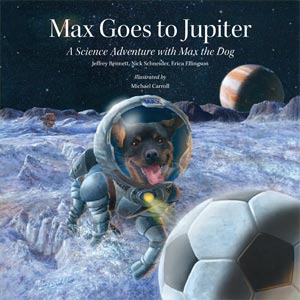Colorado Parent – January, 2009

 A dog in space? Sure, why not. In Max Goes to Jupiter, the newest book from the award-winning Max Adventure series, Boulder author, astrophysicist and father of two, Jeffrey Bennett, sends feisty Max, a 100-pound Rottweiler into the solar system. What started out as a story Bennett told his son has turned into an entertaining, educational book series for children everywhere.
A dog in space? Sure, why not. In Max Goes to Jupiter, the newest book from the award-winning Max Adventure series, Boulder author, astrophysicist and father of two, Jeffrey Bennett, sends feisty Max, a 100-pound Rottweiler into the solar system. What started out as a story Bennett told his son has turned into an entertaining, educational book series for children everywhere.
As a graduate student, Bennett discovered an interest in education while teaching in an elementary school. He now visits schools around the country to talk about space and science. Most recently, he has been sharing his love of space via videoconference to kids at a space camp in South Africa. Bennett, also the author of bestselling college textbooks in mathematics, statistics, astronomy and astrobiology, sends Max into space, but always brings the message back to earth. “It’s not just about going out into space, but how that affects us here on earth,” says Bennett. “Space shows kids that there are great things they can dream about.”
Colorado Parent: What inspired the book series? Jeffrey Bennett: It was something I’d always wanted to do, to write a children’s book. I just didn’t know what the story was. Then one day I was out with Grant, my son, who was 6 months old at the time. I was pushing him in the stroller, and you know how you’re supposed to talk to your baby? I just kept wondering, what am I going to say to a baby? So I decided to tell him a little story. That day the moon was up in the morning sky and our dog Max was along with us for the walk. So, I decided I’d tell Grant a story about Max going to the moon. By the time I got home, I thought hmm maybe that’s the book I’ve been waiting to write.
CP: Where did your interest in space come from?
JB: I grew up during the Apollo era so that was a major part of it. As a kid I was disappointed by the pace of space exploration. My Grandfather took me to see the movie, 2001: A Space Odyssey when I was in 3rd or 4th grade, and on the way out he asked me if I thought the movie was realistic. I said “No. It’s 2001 and they are just getting to the moon!” I was thinking that we should be much further by 2001.
CP: Why is space so fascinating for children?
JB: It’s the same thing that makes adults interested in space: It’s bigger than we are. It makes us ask questions about who we are and why we are. I also think it’s exploration. Go back in history and kids have always been interested in exploration. Now space is the only thing left to explore.
CP: Why do you think this series appeals to people?
JB: It is designed for kids and parents or teachers to read together. This gives them a chance to really talk together. There is the story, but also the “Big Kid Boxes” to provide science answers. Kids can keep going back to get a deeper understanding of the book as time goes on.
CP: What is the best thing that has come out of the book series?
JB: On a personal level, it’s fun for me and my kids to have this involvement. My kids will go with me to some visits. Also, it gets more kids interested in science and space, and exploring the world. I want kids to really dream of these great things they can do as an individual or society.
CP: “Max” often goes with you to schools or book signings. How does he handle his fame?
JB: When we do school visits, I let him sit by the door as the kids leave. He’ll lick every one of the 300 kids as they pass by.
CP: What is next?
JB: I want my kids to be proud of their dad. They were excited that I was writing books that their friends liked. Now they are getting a little older, so I’m looking at an idea for middle school kids. It’s something fun that we do together.
Did you know?
It was Galileo Galilei’s discovery of moons orbiting Jupiter that lead him to prove that earth is not the center of the universe. 2009 marks the 400th anniversary of Galileo’s discovery.
